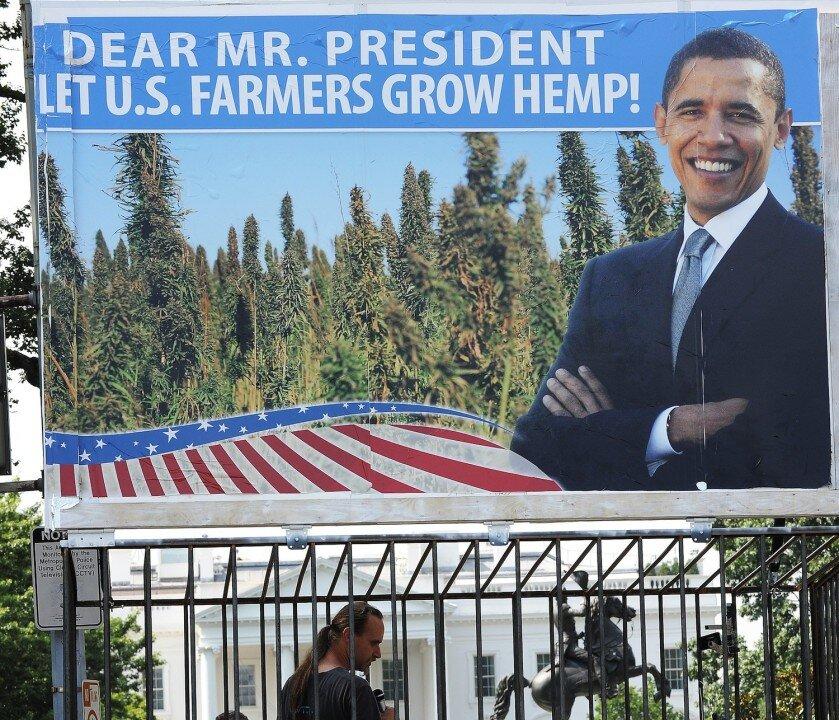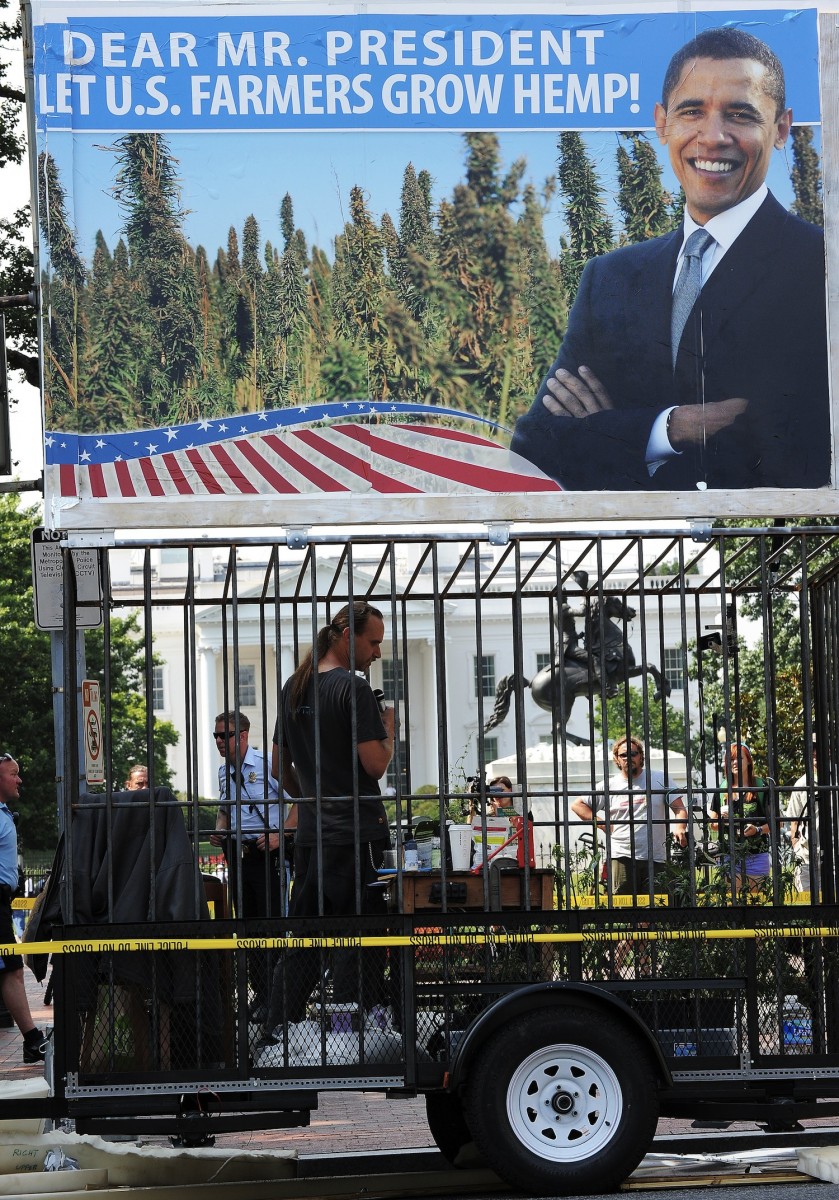In the long battle to bring industrial hemp farming back to the United States, the latest victories have been in Kentucky. On Feb. 11, the Kentucky Senate Agriculture Committee voted unanimously in favor of a bill to license industrial hemp farming in the Bluegrass State.
Kentucky Agriculture Commissioner James Comer is a driving force behind Kentucky Senate Bill 50. His pro-hemp platform is what got him elected, and he has been making the pitch to fellow lawmakers ever since. Spurred by Comer’s influence and a weak economy, Kentucky’s federal delegates are working toward necessary changes in Washington, D.C.
Reps. Thomas Massie (R-Ky.) and John Yarmuth (D-Ky.) introduced a bill to the U.S. House this month that will reclassify hemp from addictive and dangerous to pretty much harmless. Sen. Rand Paul (R-Ky.) and Senate Minority Leader Mitch McConnell (R-Ky.) are pushing a similar bill in the Senate.
McConnell staunchly opposes marijuana legalization, but once he was assured that allowing hemp would not promote illegal drug use, he was on board.
“The utilization of hemp to produce everything from clothing to paper is real and if there is a capacity to center a new domestic industry in Kentucky that will create jobs in these difficult economic times that sounds like a good thing to me,” McConnell said in a press release.
Comer admits that hemp can be politically controversial, but he said that once you see the facts, “it’s a no brainer”—the sustainable crop promises to create jobs with no borrowing or tax incentives.
Support for hemp farming has been growing among legislators throughout the country—19 states now have pro-hemp legislation—but it has taken some time for lawmakers to warm up to the idea.
Preceding the swell of political support is an education campaign to dispel hemp myths, and the organization Vote Hemp Inc. has played a crucial role in this regard. Since 2000, the nonprofit political action group has been working to help lawmakers and the public alike separate fact from fiction.
Tom Murphy, the organization’s outreach coordinator, said that one of the bigger misconceptions is the belief that hemp is just a back door for marijuana legalization—an idea popularized by former director of the Office of National Drug Control Policy Barry McCaffrey when he labeled hemp a “stalking horse” or decoy.
“The funny thing is, if you look at the history of medical and recreational marijuana, industrial legislation actually follows it—it doesn’t precede it,” Murphy said. “We don’t have nearly the money that NORML, and the drug policy alliance, and the rest of the policy organizations have. We ask the big funders of all of those organizations to help fund us, too, and we get very little.”
In fact, outside of law enforcement, marijuana growers are the most outspoken opponents of industrial hemp, according to Vote Hemp President Eric Steenstra. Police in Kentucky warned that growers might try to hide marijuana in hemp fields to avoid detection, but Steenstra said that hemp is actually the last plant a drug cultivar wants to see.
“When a no-THC hemp plant pollinates a high-THC marijuana plant, the seeds produced from that are going to be reduced significantly in potency,” said Steenstra. “There’s no positive for a marijuana grower to have hemp grown nearby, and the pollen can travel great distances. It’s been reported to travel over 10 miles.”
Not a Drug
Hemp supporters insist that the plant is not a drug, but law enforcement officials still hold doubts. During his testimony before the Kentucky Legislature, State Police Commissioner Rodney Brewer said that one of his key concerns is people using the plant for intoxication.
“It’s scientifically untrue that you can get high from industrial hemp, and if somebody told him that, they’re purposely misleading him,” Murphy said. “The joint the size of a telephone pole that people talk about is hyperbole. You cannot get high from smoking hemp.”
Because hemp is closely related to marijuana, it does contain psychoactive cannabinoids, but levels are very low—high grades of marijuana devote as much as one-quarter of the plant’s chemistry to the psychoactive Tetrahydrocannabinol (THC), while hemp contains at most 0.3 percent.
“Haven’t we hammered that horse to death?” asked plant breeder Dr. David West. “Really, there’s just not enough of the good stuff in there. It’s like near beer.”
West, who holds a doctorate in plant breeding and genetics from the University of Minnesota, began his career in corn, but his insight into cannabis is uniquely informed. From 1999 to 2003, West obtained one of very few federal licenses to grow hemp, and he conducted a trial in Hawaii to see how the crop would fare in the balmy climate. The crop performed poorly, lacking the height and vigor the plant enjoys in a temperate zone.
“It was not an unexpected result, I told them it was going to happen,” West said. “It’s all about adaptation. We had hemp developed in Kentucky by the USDA—a unique variety that was called Kentucky hemp—but we do not have the seed that we once had. This is the real travesty of the story.”
According to West, the intoxication issue is just a distraction from the most important questions.
“Why is it that we allowed them to take away from us the right to grow a plant so easily with this sham argument?” he asked. “Instead of looking at the fact that we have been robbed of a fundamental human right, we’re going to worry about a guy who’s going to concentrate enough THC—that poor fellow. How many billions of dollars have we spent to prevent Joe Schmo in his home laboratory from trying to do that? That’s just beyond ridiculous, it’s spurious.”
Hemp was a staple crop in North America for centuries, and according to West, the return to hemp is only natural—the plant offers numerous applications and is carbon negative to boot.
From health food to car parts and new building materials like Hempcrete, hemp is utilized by a number of industries. While hemp products are legal to sell in the United States, federal law forces raw material to be imported from elsewhere, and critics contend that American farmers are missing out for no good reason.
“Just in foods and body care, we’re talking about well over $100 million [in annual sales] in the U.S. And then you add in textiles, you add in the car parts … one-third of the Mercedes line is now made with hemp interior parts in it,” said Steenstra. “It’s difficult to quantify all of the market, but we’re talking about a market that’s in the hundreds of millions.”
Schedule One Status
Police, however, remain concerned for good reason—the law. According to the Comprehensive Drug Abuse Prevention and Control Act of 1970, popularly known as the Controlled Substances Act, all cannabis is classified as Schedule 1, which means that it holds “a high potential for abuse” and “severe psychological or physical dependence.” Although several states have already legalized hemp, the federal penalty for growing on an industrial scale is too great.
“Congress created the problem for industrial hemp when they wrote the Controlled Substances Act—they did not distinguish between marijuana and hemp,” said Steenstra. “Theoretically, there was supposed to be a review process for that, but that never actually happened. Now Congress really needs to come back to fix the problem in order to allow states to regulate this.”
Up until the early 20th century, hemp was a major American crop. West pointed to enormous stands and hedgerows of feral hemp growing throughout the Midwest as signs of bygone agricultural projects from World War II and before.
“Hemp is growing indigenous now—it’s called ditch weed,” he said. “Its reputation was tarnished by the whole federal thing, and when synthetics came along that was pretty much the death knell of it.”
America’s feral hemp symbolizes a legacy, but according to West, ditch weed also contains some important genetic resources that breeders can still utilize.
However, feral hemp also presents value to law enforcement, which explains why police are concerned that legalizing the plant will cut into their drug eradication funding.
“[Kentucky police] said that they eradicated $880 million worth of marijuana last year, but that doesn’t account for the fact that a good portion of what they eradicated was ditch weed,” said Murphy. “It might be defined as marijuana in law, but it doesn’t have the capability of being a drug or making drug products from it.”
“Is it really necessary for an agency of the federal government to absolutely proscribe the growing of this plant to American farmers? It’s like our culture will go to any lengths to prevent this evil intrusion,” said West. “We’re willing to sacrifice whatever it takes because we think this is somehow going to be the end of our civilization if this plant were allowed.”







